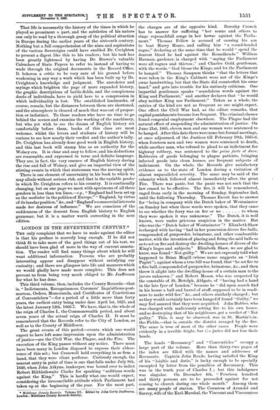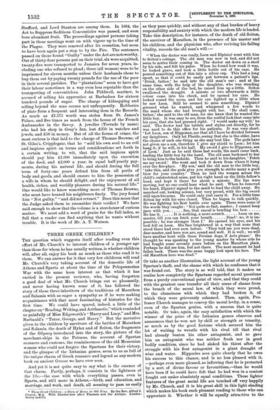LONDON IN THE SEVENTEENTH CENTURY.* THE only complaint that we
have to make against the editor is that his preface is scarcely long enough. If he did not think fit to take more of the good things out of his text, we should have been glad of more in the way of current annota- tion. The reader will find many things about which he will want additional information. Persons who are probably interesting appear and disappear without satisfying our curiosity; and there are glimpses into life and manners which we would gladly have made more complete. This does not prevent us from being very much obliged to Mr. Jeaffreson for what he has done.
This third volume, then, includes the County Records—that is, " Indictments, Recognisances, Coroners' Inquisitions-post- mortem, Orders, Memoranda, and Certificates of Convictions of Conventiclers "—for a period of a little more than forty years, the earliest entry being under date April 1st, 1625, and the latest January 12th, 1666-7. We have, that is, the whole of the reign of Charles I., the Commonwealth period, and about seven years of the actual reign of Charles II. It must be remembered that the Records refer to the City of London, as well as to the County of Middlesex.
The great events of this period—events which one would expect to have left some impression upon the administration of justice—are the Civil War, the Plague, and the Fire. The execution of the King passes without any notice. There must have been many in London disposed to express their abhor- rence of this act ; but Cromwell held everything in so firm a hand, that they were silent perforce. Curiously enough, the nearest entry in point of time is one that falls under July 9th, 1648, when John Atkyns, innkeeper, was bound over to indict Robert Hibblethwaite Clarke for speaking " seditious words against the King." This is hardly what one would expect, considering the irreconcilable attitude which Parliament had taken up at the beginning of the year. For the most part,
* Middlesex County Records. Volume M. Edited by Jobs Cordy Jeaffreson. London:' Middlesex County Records Society. the charges are of the opposite kind. Dorothy Crowch has to answer for suffering " her sonne and others to singe reproachfull songs in her howse against the Parlia- ment." Thomas Fellow is accused of causing his son to beat Harry Hoare, and calling him " a round-headed rogue," declaring at the same time that he would " spend the dearest blood ho had against the Roundheads." William Harman, gardener, is charged with " saying the Parliament were all rogues and thieves ;" and Charles Gold, gentleman, with the words, " God blouse the Kinge, and let the Parliament be hanged." Thomas Sampson thinks "that the letters that were taken in the King's Cabinett were not of the Kluge's owne handwriting, but that the State did counterfeit his owne hand," and gets into trouble for his untimely criticism. One impartial gentleman speaks " scandalous words against the King and Parliament," and another declares that " he would obey neither King nor Parliament." Taken as a whole, the entries of the kind are not as frequent as one might expect. One effect the Civil War had, as the editor remarks, that capital punishments became less frequent. The criminal classes found congenial employment elsewhere. The Plague had the natural effect of suspending the administration of justice. On June 21st, 1665, eleven men and one woman were sentenced to be hanged. After this date there were none but formal meetingr, at once adjourned, of the Justices till February 19th, 1665-6, when fourteen men and two women were sentenced to death, while another man, who refused to plead to an indictment for highway robbery, was sentenced to the peine forte et dare. Robberies of goods belonging to plague patients, bringing infected goods into clean houses, are frequent subjects of indictment. On the whole, the Records give satisfactory evidence as to the state of London during a visitation of almost unparalleled severity. The same may be said of the calamity which followed almost immediately after, the great Fire. There was panic, but the panic was not such that the law ceased to be effective. The fire, it will be remembered, raged from early in the morning of Sunday, September 2nd, until the following Thursday. Thomas Escott has to answer for "being in company with the Dutch baker of Westminster on Sunday last when these words were spoken, that they came to see whether the ferry was on fier or no to whom they were spoken it was unknown." The Dutch, it is well known, were under grievous suspicion in the matter. But who was the " Dutch baker of Westminster "? Elizabeth Shaw is charged with having " had in her possession divers fire-balls, compounded of gunpowder, brimstone, and other combustible matter, with the intention of placing and firing the said balls so as to set on fire and destroy the dwelling-houses of divers of the King's lieges and subjects." Elizabeth Shaw, we are glad to know, was found " Not guilty." We are not expressly told what happened to Brian Mogill (whose name suggests an " Irish Papist"), against whom a true bill was found, that "he set fire to a fire-ball, compounded of gunpowder, brimstone, &c., and then threw it alight into the dwelling-house of a certain man to the jurors unknown ;" and Robert Mason, who was suspected by the constable of St. Botolph, Mdgate, of "having had a hand in the late fyer of London," because he " did upon search find in his house a ball and barrel of stuff, supposed to be in readi- ness to make wild fier," &c., and others similarly charged ; but as they would certainly have been hanged if found "Guilty," we may feel assured that they were acquitted. John Hobbes, who was charged with maliciously setting fire to his own house. and so destroying that of his neighbours, got a verdict of " Not
guilty." This, it may be observed, was in St. Martin's-in- the-Fields,—that is, outside the district ravaged by the fire.
The same is true of most of the other cases. People were evidently in a terrible fright, but tie juries did not lose their heads.
The heads "Recusancy" and " Conventicles " occupy a large part of the volume. More than thirty-two pages of the index are filled with the names and addresses of Recusants. Captain John Reade, having satisfied the King of his " loialtie and dutie," is lucky enough to be specially exempted by letter from the penalties of Recusancy. This was in the tenth year of Charles I. ; but this indulgence was singular. On December 4th, " Fourteen hundred and thirty persons are to be proceeded against for not coming to church during one whole month." Among them are many people of station. The Countess of Arundel and Surrey, wife of the Earl-Marshal, the Viscount and Viscountess
Stafford, and Lord Stanton are among them. In 1664, the Act to Suppress Seditious Conventicles was passed, and soon bore abundant fruit. The proceedings against persons taking part in these meetings went on with vigour up to the time of the Plague. They were renewed after its cessation, but seem to have been again put a stop to by the Fire. The sentences passed on those found "Guilty" under the Act are noteworthy. Out of thirty-four persons put on their trial, six were acquitted, twenty-five were transported to Jamaica for seven years, in- cluding one who refused to plead; three (all women) were to be imprisoned for eleven months unless their husbands chose to buy them out by paying twenty pounds for the use of the poor in their several parishes. The " plantations" seem to have got their labour sometimes in a way even less reputable than the transporting of conventiclers. John Piddwell, mariner, is accused of selling his apprentice at Barbadoes for sixteen hundred pounds of sugar. The charge of kidnapping and selling beyond the seas occurs not unfrequently. Robberies of plate form a frequent and interesting item in the Records. As much as £1,575 worth was stolen from St. James's Palace, and five times as much from the house of the French Ambassador in the Savoy. A jeweller (Torrado by name) who had his shop in Gray's Inn, lost £350 in watches and jewels, and £58 in money. But of all the forms of crime, the most curious is that laid to the charge of Thomas Browne, of St. Giles's, Cripplegate, that he " sold his own soul to an evil and impious spirit on terms and considerations set forth in a certain writing, to wit, that the said impious spirit should pay him £1,000 immediately upon the execution of the deed, and £2,000 a year, in equal half-yearly pay- ments, during his natural life, and should during the full term of forty-one years defend him from all perils of body and goods, and should ensure to him the possession of a wife in whom he should delight, and the enjoyment of all health, riches, and worldly pleasure during his natural life." One would like to know something more of Thomas Browne, who must have hoaxed his neighbours finely. The jury found him " Not guilty," " and did not retract." Does this mean that the Judge asked them to reconsider their verdict P We have said enough to show that the volume is a storehouse of curious matter. We must add a word of praise for the fall index, so full that a reader can find anything that he wants without trouble. It is the work of Mr. A. T. Watson.



















































 Previous page
Previous page